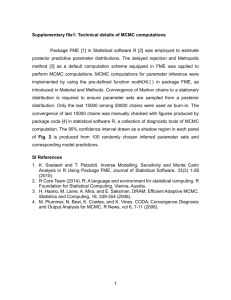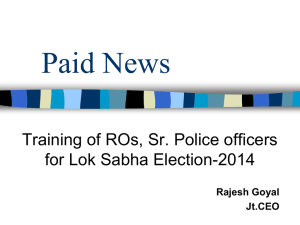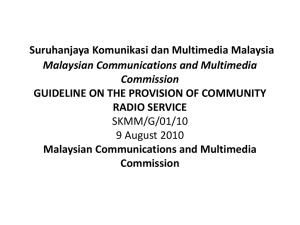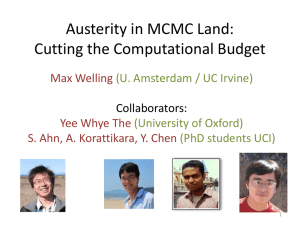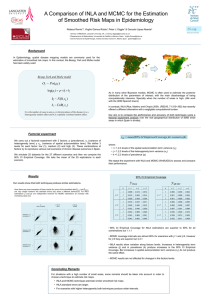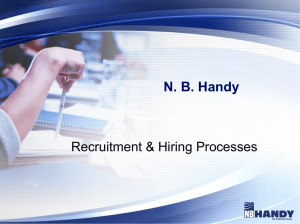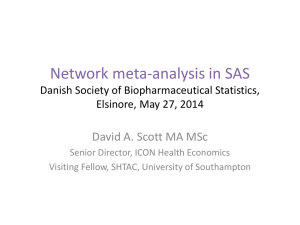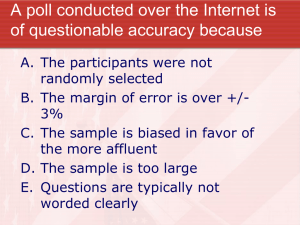PPT Presentation on Paid News - Chief Electoral Officer, Delhi
advertisement
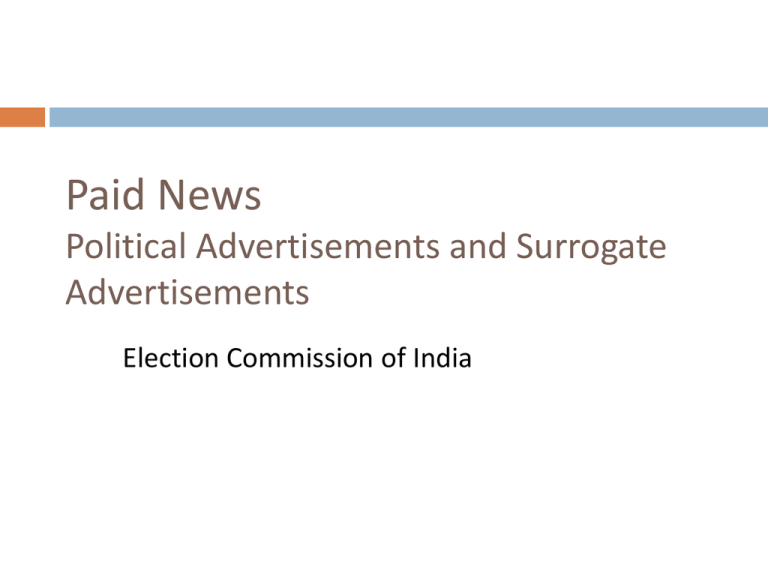
Paid News Political Advertisements and Surrogate Advertisements Election Commission of India Legal Provisions Sections 126 of R.P. Act 1951prohibits display of any election matter by means of cinematograph, television or other similar apparatus, in any polling area during the period of 48 hours ending with the hour fixed for the conclusion of the poll. Section 126A of the R.P. Act 1951prohibits exit poll and dissemination the result of any exit poll during such period as may be notified by the ECI Section 127A of R.P. Act 1951 prohibits printing or publishing any election pamphlet or poster which does not bear on its face the names and addresses of the printer and the publisher thereof. Indian Penal Code 171H - Whoever without the authority in writing of a candidate shall be punished Section 10A of R.P. Act 1951 disqualifies a candidate for failure to lodge account of election expenses within the time and in the manner required under this Act Media Certification & Monitoring Committees District MCMC chaired by DEO Addl/Jt CEO level Committee at State Capital State MCMC chaired by CEO Role of District MCMC Certification of Advertisements Checking violations of legal provisions regarding advertisements Check on Paid News Role of addl/Jt CEO Committee Previewing, scrutinizing and verifying all advertisements by political parties, political parties and all organizations / group of person/ associations having their HQs/ registered offices in State/UT before it is inserted in the electronic media. Refer circular No. 509/75/2004/JS-1 dated 15th April, 2004 consequent upon order of the Hon’ble Supreme Court of India in SLP © No. 6679/2004. (Ministry of Information and Broadcasting vs. M/s Gemini TV Pvt. Ltd and Others) Role of State MCMC Deciding on appeals against District MCMC and Addl/Jt CEO Committee on certification of advertisement for electronic media Deciding on appeals against District MCMC on ‘Paid News’ cases If cases of paid news are sent directly to State MCMC, it may refer it to the concerned District MCMC Appeal Appeal against decision of District MCMCs on certification of advertisements and paid news cases will be at State MCMC Appeal against decision of Addl/Jt CEO level Committee on certification of advertisements will be at State level MCMC Appeal against decision of State MCMC shall be at ECI Monitoring political advertisements in electronic media - for checking if the telecast/broadcast has been done only after certification by the Committee in other media, in relation to candidates, either overt or covert, from expenditure monitoring angle (this will also include publicity or advertisement or appeal by, or on behalf of candidate, or by star campaigner(s) or others, to impact candidate’s electoral prospects) Checking Print media in print media - MCMC shall check if the advertisement is with the consent or knowledge of candidate: in which case it will be accounted for in the election expenses of the candidate(s); Checking if the name and address of the publisher and the printer is carried on any election pamphlet, poster, hand bill and other document as required under section 127A of R.P.A 1951 (if any printed material does not bear on its face the names and addresses of the printer or the publisher, MCMC shall bring it to the notice of the RO for further necessary action; For the purpose of section 127 of RPA 1951, ‘paid news’ would also fall in the category of ‘other document’) Paid News : definition Press Council of India definition - Any news or analysis appearing in any media (Print & Electronic) for a price in cash or kind as consideration. PCI guidelines also say- news should be clearly demarcated from advertisements by printing disclaimers, should be strictly enforced by all publications. As far as news is concerned, it must always carry a credit line and should be set in a typeface that would distinguish it from advertisements. Paid News - issues Paid News misleads the public and hampers the ability of people to form correct opinions. Paid News causes undue influence on voters and also affects their Right to Information. Paid News seeks to circumvent election expenditure laws/ ceiling It also vitiates the principle of level playing field among candidates District Media Certification and Monitoring Committee - role The Committee will scrutinise all media within its region of jurisdiction to identify political advertisement in the garb of news. District MCMC shall also actively consider paid news cases referred to it by the Expenditure Observers. District MCMC shall intimate the Returning Officer for issue of notices to candidates for inclusion of actual expenditure on the published matter in their election expenses account or notional expenditure based on DIPR rates in their election expenses account irrespective of whether the candidate actually has paid or not paid any amount to the channel/newspaper. A copy of the notice shall also be marked to Expenditure Observer) District Media Certification and Monitoring Committee - role On reference from District MCMC, RO shall give notice to the candidates within 96 hrs of publication/ broadcast/ telecast/receipt of complaint to explain why expenditure should not be added to the candidate’s expenditure. District MCMC shall decide on the reply expeditiously and convey to the Candidate/Party its final decision. In case no reply is received by District MCMC from the candidate within 48 hrs of serving of notice, the decision of MCMC will be final. If decision of District level MCMC is not acceptable to the candidate, he/she may appeal to State level MCMC within 48 hrs of receipt of decision, with information to the District MCMC. Appeal Mechanism for Paid News The State level MCMC shall dispose of the appeal case within 96 hrs of receipt of appeal and convey the decision to the Candidate with a copy to District MCMC. The Candidate may appeal against the decision of State MCMC to ECI within 48 hrs of receiving of order from the State MCMC. The decision of ECI shall be final. Additional Checks : District Collectors have been instructed to take meeting with Political Parties as well as media houses to alert them against surrogate advertising and Paid News and consequences of violation. Political parties and media houses have been briefed and sensitized in advance at HQs. ECI has written to Press Council of India for support to strengthen this mechanism. Action against Media House For cases finally accepted/decided as paid news, the same shall be compiled and forwarded by State MCMC to ECI The paid news cases relating to print media shall be referred by ECI to Press Council of India for action against the concerned Media House. The case in electronic media shall be referred to NBA for action against the Media House Status Through enforcement of the measures against Paid News for the first time in the Bihar Assembly elections of 2010, Commission had served notices in 121 cases. In the elections in Assam, Kerala, West Bengal, Puducherry and Tamil Nadu, over 250 notices were issued. In the 2012 State elections, 766 complaints were received, out of which notices were issued in 581 cases. In 253 cases the candidates included the expenditure in their accounts, while in remianing cases decision is being taken/ candidates have appealed against the decision of the MCMC Electoral Reforms proposed By ECI on Paid News Amendment in the Representation of RPA 1951, to provide therein that publishing and abetting the publishing of `paid news’ for furthering the prospect of election of any candidate or for prejudicially affecting the prospect of election of any candidate be made an electoral offence under chapter-III of Part-VII of Representation of People Act, 1951 with punishment of a minimum of two years imprisonment. Date of proposal – 3rd February, 2011 Challenges There is circumstantial evidence, but little proof. Establishing transaction of cash or kind is indeed not very easy, as it is usually done without any record and promptly denied by both sides, when enquired. When confronted with circumstantial evidence the standard reaction of individuals candidate is to flatly deny these allegations. The Commission is trying to include professional members in the Monitoring Committee to help identify Paid News. The Commission is coming up with Illustrations to help MCMCs to decide on cases of paid news. Way ahead The Commission considers self regulation by political parties, candidates and media houses as one of the main solution to this malaise. The enforcement needs to be more streamlined and the instructions would require higher clarity. As the Commission’s intention is more preventive rather than punitive, it is undertaking educational campaign on Paid News involving political parties, media houses and other stakeholders. Thanks
